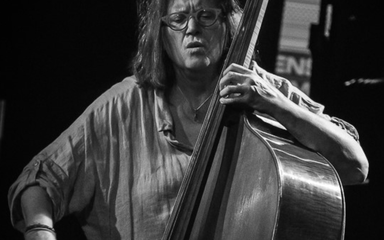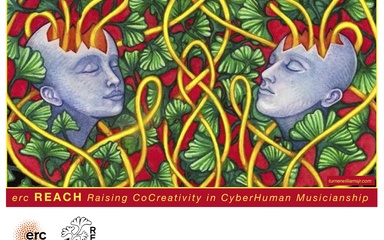Gérard Assayag a obtenu l' "ERC Advanced Grant" pour le projet REACH
REACH : Renforcer la co-créativité dans la complicité musicale cyber-humaine
ERC Advanced Grant attribué à Gérard ASSAYAG
En partenariat avec UCSD (Shlomo Dubnov) et EHESS (Marc Chemillier)
L'imbrication de la créativité humaine avec les processus computationnels environnants suscite de nouvelles potentialités d'action conjointe homme-machine et de nouveaux modèles d'interaction. Des formes originales de réalité partagée impliquant des "interactions symbiotiques" se généraliseront dans les arts et l'activité humaine en général. La co-créativité entre les humains et les machines entraînera l'émergence de structures d'information distribuées et performatives impliquant la coopération d'agents artificiels et humains. Cela transformera certainement les ordres culturels connus et aura un impact significatif sur le développement humain. L'apprentissage génératif de représentations symboliques à partir de signaux physiques et humains, et la compréhension des stratégies artistiques et sociales de l'improvisation nous aideront à mieux comprendre cette dynamique de coopération (ou de conflits) inhérente aux réseaux cyber-humains.
Pour cela, le projet REACH vise à comprendre, modéliser et développer la co-créativité musicale entre les humains et les machines par le biais d'interactions improvisées, permettant aux musiciens de tout niveau de formation de développer leurs compétences et d'accroître leur potentiel créatif individuel et social. En effet, l'improvisation est au cœur même de toutes les interactions humaines, et la musique est un terrain fertile pour développer des modèles et des outils de créativité qui peuvent être généralisés à d'autres activités, du fait de la richesse de ses structures et de ses contraintes qui favorisent l’émergence de comportement coopératifs et de cours d'actions fortement intégrés. REACH étudiera la "musicalité partagée" à l'intersection des sphères physique, humaine et numérique, comme archétype d’une intelligence distribuée, et produira des modèles et des outils pour mieux comprendre et encourager la créativité humaine dans un contexte où elle est de plus en plus imbriquée avec le calcul.REACH part de l’hypothèse que la co-créativité dans les systèmes cyber-humains résulte d’une forme d’émergence de comportements cohérents et de régimes non-linéaire de formation d’événements et de structures, qui conduisent à une riche co-évolution des formes musicales. Ces phénomènes résultent de processus d'apprentissage croisé entre agents impliquant des boucles de rétroaction et des mécanismes de renforcement complexes. REACH étudiera ces mécanismes in vivo et in vitro, et produira des outils créatifs, par la convergence de méthodes issues des recherches en créativité computationnelle interactive, en intelligence artificielle et machine learning, en sciences sociales avec l'anthropologie des pratiques improvisées (collaboration avec le CAMS à l’EHESS), et des systèmes de réalité mixte instrumentaux (collaboration avec la compagnie HyVibe).
Aller à la page du projet de recherche

REACH : Renforcer la co-créativité dans la complicité musicale cyber-humaine

La grande contrebassiste Joëlle Léandre sera en résidence à l'Ircam de Juin 2022 à Juin 2023 dans le cadre du projet REACH

REACHing OUT gathers information about how the ERC REACH project disseminate through medias, residencies, productions, etc.

La démarche du scientifique s’inscrit dans une stratégie de recherche-création, proche du processus artistique. Gérard Assayag relie les deux domaines musique et sci…

Eva Amsen, contributrice scientifique chez Forbes, a écrit un article sur le projet Reach, qui met en lumière la collaboration qui se met en place avec l'université UC San Diego …